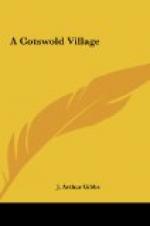Yes, dear reader,
“Though
inland far we be,
Our souls have sight
of that immortal sea
Which brought
us hither.”
When the sun goes down, if you will turn for a little while from the noise and clamour of the busy world, you shall list to those voices ringing, ringing in your ears. Words of comfort shall you hear at eventide, “and sorrow and sadness shall be no more,”—even though, as the years roll on, perforce you cry, with Wordsworth:
“What though the
radiance which was once so bright
Be now for ever
taken from my sight,
Though nothing
can bring back the hour
Of splendour in
the grass, of glory in the flower,
We
will grieve not, rather find
Strength
in what remains behind;
In
the primal sympathy
Which
having been must ever be;
In
the soothing thoughts that spring
Out
of human suffering;
In
the faith that looks through death,
In
years that bring the philosophic mind.”
THE END.
APPENDIX.
GEORGE RIDLER’S OVEN.
(Note from the papers of the Gloucestershire Society)
It is now generally understood that the words of this song have a hidden meaning which was only known to the members of the Gloucestershire Society, whose foundation dates from the year 1657. This was three years before the restoration of Charles II. and when the people were growing weary of the rule of Oliver Cromwell. The Society consisted of Loyalists, whose object in combining was to be prepared to aid in the restoration of the ancient constitution of the kingdom whenever a favourable opportunity should present itself. The Cavalier or Royalist party were supported by the Roman Catholics of the old and influential families of the kingdom; and some of the Dissenters, who were disgusted with the treatment they received from Cromwell, occasionally lent them a kind of passive aid. Taking these considerations as the keynote to the song, attempts have been made to discover the meaning which was originally attached to its leading words. It is difficult at the present time to give a clear explanation of all its points. The following, however, is consistent throughout, and is, we believe, correct:—
“The stwuns that
built Gaarge Ridler’s oven,
And thauy qeum
from the Bleakeney’s Quaar;
And Gaarge he
wur a jolly ould mon,
And his yead it
graw’d above his yare.”
By “George Ridler” was meant King Charles I. The “oven” was the Cavalier party. The “stwuns” which built the oven, and which “came out of the Blakeney Quaar,” were the immediate followers of the Marquis of Worcester, who held out to the last steadfastly for the royal cause at Raglan Castle, which was not surrendered till 1646, and was, in fact, the last stronghold retained for the king. “His head did grow above his hair” was an allusion to the crown, the head of the State, and which the king wore “above his hair.”




